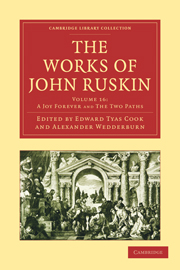Book contents
- Frontmatter
- Contents
- LIST OF ILLUSTRATIONS
- INTRODUCTION TO THIS VOLUME
- PART I “A JOY FOR EVER” BEING THE SUBSTANCE (WITH ADDITIONS) OF TWO LECTURES ON THE POLITICAL ECONOMY OF ART (1857, 1880)
- PART II INAUGURAL ADDRESS AT THE CAMBRIDGE SCHOOL OF ART (1858)
- PART III THE OXFORD MUSEUM (1858, 1859)
- BIBLIOGRAPHICAL NOTE
- FIRST LETTER (JUNE 1858)
- SECOND LETTER (JANUARY 20, 1859)
- APPENDIX: PREFACE TO THE RE-ISSUE OF 1893 BY SIR HENRY ACLAND, WITH A MESSAGE FROM RUSKIN
- PART IV “THE TWO PATHS” (1859)
- APPENDIX: ADDRESSES AND LETTERS 1856–1860
- Plate section
FIRST LETTER (JUNE 1858)
Published online by Cambridge University Press: 07 September 2011
- Frontmatter
- Contents
- LIST OF ILLUSTRATIONS
- INTRODUCTION TO THIS VOLUME
- PART I “A JOY FOR EVER” BEING THE SUBSTANCE (WITH ADDITIONS) OF TWO LECTURES ON THE POLITICAL ECONOMY OF ART (1857, 1880)
- PART II INAUGURAL ADDRESS AT THE CAMBRIDGE SCHOOL OF ART (1858)
- PART III THE OXFORD MUSEUM (1858, 1859)
- BIBLIOGRAPHICAL NOTE
- FIRST LETTER (JUNE 1858)
- SECOND LETTER (JANUARY 20, 1859)
- APPENDIX: PREFACE TO THE RE-ISSUE OF 1893 BY SIR HENRY ACLAND, WITH A MESSAGE FROM RUSKIN
- PART IV “THE TWO PATHS” (1859)
- APPENDIX: ADDRESSES AND LETTERS 1856–1860
- Plate section
Summary
RHEINFELDEN, 5th May 1858
1. Dear Acland, —I have been very anxious, since I last heard from you, respecting the progress of the works at the Museum, as I thought I could trace in your expressions some doubt of an entirely satisfactory issue.
Entirely satisfactory very few issues are, or can be; and when the enterprise, as in this instance, involves the development of many new and progressive principles, we must always be prepared for a due measure of disappointment—due partly to human weakness, and partly to what the ancients would have called fate—and we may, perhaps, most wisely call Law of Trial, which forbids any great good being usually accomplished without various compensations and deductions, probably not a little humiliating.
Perhaps in writing to you what seems to me to be the bearing of matters respecting your Museum, I may be answering a few of the doubts of others, as well as fears of your own.
2. I am quite sure that when you first used your influence to advocate the claims of a Gothic design, you did so under the conviction, shared by all the seriously purposed defenders of the Gothic style, that the essence and power of Gothic, properly so called, lay in its adaptability to all need; in that perfect and unlimited flexibility which would enable the architect to provide all that was required, in the simplest and most convenient way; and to give you the best offices, the best lecture-rooms, laboratories, and museums, which could be provided with the sum of money at his disposal.
- Type
- Chapter
- Information
- The Works of John Ruskin , pp. 211 - 217Publisher: Cambridge University PressPrint publication year: 2010First published in: 1905

